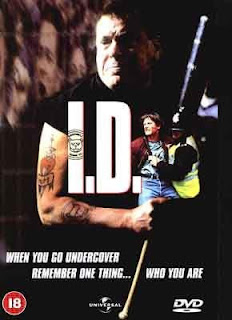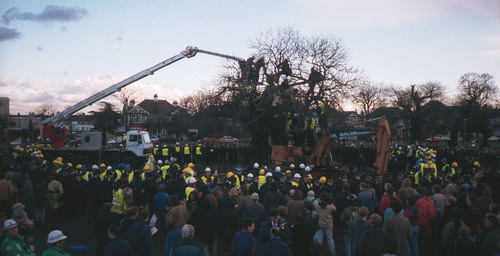http://www.guardian.co.uk/environment/2011/jan/10/activists-undercover-officer-mark-kennedy ) The case collapsed because the key prosecution witness, a police officer who had been working undercover for several years in the environmental direct activist movement, had apparently 'changed sides' by offering to give evidence in support of the defence.
The term ‘going native’ has its origins in early (racist) anthropology. In the social sciences, it refers to the researcher uncritically adopting the concepts and categories of those being studied, rather than retaining the aloof perspective of insider-yet-outsider that is the mark of the professional ethnographer. An example often cited in sociology textbooks is Paul Willis’s (1977) classic study of working class school students’ culture of underachievement. Willis was criticized by some for his adoption of the worldview, and indeed the language, of the boys he was studying.
In relation to ‘collective behaviour’ – crowd phenomena, protest events, social movements and mass campaigns – the notion of ‘going native’ raises issues about psychological process as well as questions of method.
The psychology of transformation in the collective
In the 1995 feature film ‘I.D.’ a police officer sent undercover to infiltrate football hooligan gangs ‘turns into one of the thugs he was sent to destroy’. The excitement of violence proves irresistible, and his identity as a police officer eventually becomes lost. This psychological transformation is characterized as essentially emotional, primordial or instinctual and therefore unreflexive on the part of the central character.
I was reminded on hearing this story of an episode in my ethnographic research study of the No M11 campaign, part of the UK anti-roads movement in the early 1990s (See http://www.indymedia.org.uk/en/2004/02/285484.html ). Here too I was studying a type of psychological change that occurred in people involved in an environmental direct action campaign. Wanstead residents objected to their local green being dug up for the construction of a trunk road. They changed on a number of levels. They came to see themselves as in the ‘same group’ as the ‘activists’ who had come to the area for the protest - and indeed in the same group as activists across the country and around the world. They therefore came to see themselves as different from their local neighbours who stood passively by and watched the loss of green space. They also adopted a much more critical view of the police force: when previously the police had been seen as neutral or a protector of their individual rights, now they were seen as agents of unpopular government policy and hence ‘political’.
Eviction of George Green, Wanstead, December 1993
The ‘activists’ I spoke to attributed these changes in the views of ‘locals’ to the force of argument. They had spent long hours together in vigils to protect the green, and in that time had the opportunity to develop their points about the global significance of the ‘local’ road-building scheme and hence the political nature of ‘environmental’ issues.
The role of ‘discussion and debate’ in ‘politicizing’ people in social movements is also stressed by a number of sociologists and social psychologists. There is plenty of evidence that discussion and argument can be persuasive.
But there was something else happening at the time of the transformation of these ‘local’ people into ‘political subjects’. This was their participation in the ‘direct action’ itself. While they may have intended their participation to be different (less ‘direct’) than that of the ‘activists’, it was not seen that way by the police, who acted upon the protesters as a whole – as a crowd, in fact.
Put differently, the (unintended) consequence of the ‘locals’ acting ‘with’ the rest of the crowd was police action which served to impose a common experience (of ‘illegitimate attack’) on all, such that the distinction between ‘activist’ and ‘local’ could no longer be easily sustained. In a context when one is treated as ‘oppositional’ by the police, arguments about the ‘political’ nature of road-building will seem more plausible, and those making them more persuasive. Such people come to be seen as ‘one of us’ rather than ‘one of them’, and we might listen to more carefully.
If indeed the Met police ‘spy’ did change his views - and this is something he is reported as denying - we can only speculate about the exact processes behind such a change.
However we can note, first, that environmental direct activists have good arguments – global warming, vested interests, the nature of social change, and so on. But but they always have had good arguments, and these aren’t usually enough to change the minds of serving police officers, security guards or others paid to oppose their actions!
However we can note, first, that environmental direct activists have good arguments – global warming, vested interests, the nature of social change, and so on. But but they always have had good arguments, and these aren’t usually enough to change the minds of serving police officers, security guards or others paid to oppose their actions!
Second there is the accusation that the infiltrator was more than a spy, that he took an active role in the campaigns he was involved in. His actions were not ‘passive’, it is claimed; he changed the very context within which he found himself. It may be hard to think of yourself as exactly ‘the same person’ if you have in effect changed the social environment that gives you your self-definition!
Method: Problems and opportunities of insider research
But what about the question of method?
What about me? When I carried out my ethnographic study, did I come to adopt the worldview of those I studied?
Before answering this directly, let’s point out the two most obvious differences between undercover police officers and ethnographers in the environmental direct action movement.
First and most obviously, the police officer is undercover for a reason – because his or her aim is to find (or, it is alleged, create) 'intelligence' for the purposes of disruption. She or he is insider and against the movement. The social scientific ethnographer is usually neutral or sympathetic. Linked to this, the ethnographer is not usually covert.
Some researchers have tried to justify covert research (such as Laud Humphreys in his classic study of ‘homosexual encounters in public places’, in 1970). But there are practical as well as ethical reasons why most declare themselves to those whose worlds they are researching. For one thing, trying to hide one’s true aims or identity risks discovery, anger and physical assault (such as Laud Humphreys in his classic study etc. etc.)
In my own study, I needed people in the movement to help me with the project, and to do so meant being open about my intentions.
But to be open, to gain trust, to get people to co-operate meant to be part of the campaign. Why should people give their time to a careerist parasite? I chose to research a campaign whose aims I shared. If ‘activism’ is the topic, activists are the best researchers.
So did I ‘go native’ in my analysis? The research was an attempt to say something about the processes by which people change their identities in collective action. It was not a study of the rights and wrongs of the Conservative government’s road programme, or of direct action as a political form, of police ‘public order’ tactics, or of the reality of global warming. Of course I was a subject, with my views on these and other things that people in the campaign talked about. But, for my research, I wanted to understand something of the police view of ‘the crowd’ just as much as I wanted to document and analyse the protesters’ views. By adoption of an ethnographic framework – involving interviews, observations, soundtrack recordings, and collection of archive material – I was able to achieve both of these things.
Returning to the current furore, for ‘crowd psychologists’ just as much as ‘activists’ and any other person, it is impossible not to have an opinion about the extraordinary lengths the UK police went to in order to ‘gather evidence’ on the UK and European environmental protest movements. For a critical discussion of the proportionality, assumptions and priorities that lay behind the fiasco, check out Clifford Stott’s statements on his site:
References
Drury, J., & Stott, C. (2001). Bias as a research strategy in participant observation: the case of intergroup conflict. Field Methods, 13, 47-67.


http://www.bbc.co.uk/news/uk-12158198
ReplyDeleteFrom the officers own report, it is difficult to grasp if he made his choice based on emotion or genuine agreement with their cause. As he noted, he had a sexual relationship with two other activists, one he fell in love with. The officer in question also comments on loving the rest of those around him that he spent nearly a decade with, as thy grew to become like family.
ReplyDeleteBut on the other hand, he does mention that he came to be convinced of their cause, and even accused the police of withholding tapes that could demonstrate the other activists as innocent. He also mentioned that 5 police officers beat him up when he tried to protect a female activist.
Although ESIM is not meant to explain the behavior of the individual, it does seem here that the perceived injustice of the police played a part in his choice to break a seven year case.
What statement was it you read that suggested a perceived contagion? I would be interested to find that and Im having trouble finding it.
It's interesting that in many earlier accounts, Kennedy said that as well as feeling remorse for betraying 'close friends', he also thought of what the police were doing as 'wrong', suggesting that (as John wrote in this post) his supposed transformation involved cognition as well as emotion. But he's now saying he 'did get a sort of Stockholm Syndrome' to explain his behaviour. I was under the impression that he wasn't forced into becoming an undercover officer and that the activists weren't holding him against his will. So is he trying to diminish responsibility for his two-faced behaviour by claiming he had a 'sort of Stockholm Syndrome'? (And what was he thinking, talking to the Daily Fail?)
ReplyDeletehttp://www.dailymail.co.uk/news/article-1347478/Undercover-policeman-tells-amazing-story-years-eco-warriors-I-fear-life.html
Elio -
"What statement was it you read that suggested a perceived contagion?"
I can't find anything in this post about contagion.
This comment has been removed by the author.
ReplyDeleteHi Sanj
ReplyDeleteI read contagion instead of cognition. I must of seen what I wanted to see!
Stockholm syndrome was definitely the wrong term to use, as you have rightly said it implies being held against ones will and thereby becoming attached emotionally to your captors after a duration of time. Either he is not familiar with what the term means, or he is trying justify his actions to himself.